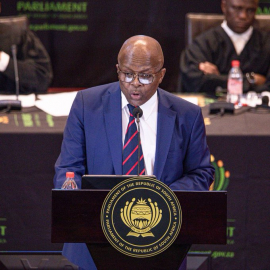
Minister in the Presidency, Mondli Gungubele, says the declaration of the National State of Disaster on Energy will assist in the speedy resolution of energy supply challenges, whilst minimising its impact and contributing to the rebuilding process.
Addressing Tuesday's debate on this year’s State of the Nation Address (SONA), Gungubele said many sectors would benefit from the stable energy supply, leading to the creation of much-needed jobs.
Eskom has been battling to keep the lights on for the past few months, leading to increased stages of load shedding and a devastating impact on lives, livelihoods and businesses.
Last Thursday, President Cyril Ramaphosa declared a State of Disaster as a response to the current energy crisis gripping the country.
At the State of the Nation Address, the President explained that the declaration will enable government to “provide practical measures” to assist businesses that have been devastated by the effects of load shedding.
Where technically possible, it will also enable government to exempt critical infrastructure, such as hospitals and water treatment plants, from load shedding.
It will enable government to accelerate energy projects and limit regulatory requirements while maintaining rigorous environmental protection, as well as procurement principles and technical standards.
Furthermore, a Minister of Energy in the Presidency is expected to be appointed to focus solely on bringing the country out of the current energy deficit.
Prior to the declaration, government had already been working on ending load shedding, as the President announced a plan to address the crisis in July 2022.
The plan was developed through extensive consultation and endorsed by energy experts as providing the best and fastest path towards energy security.
Since the plan was announced, there has been important progress in implementing the Energy Action Plan.
“As we stabilise the grid for the current economic environment, we must not forget that in the future, carbon intensity will be one of the key factors that affect the ability of our country to produce and trade in the global economy.
“To this end, there are several large initiatives that have taken off and should be scaling up in 2023/24, such as the implementation of the Green Hydrogen Strategy.
“South Africa’s Hydrogen Society (HySA) Roadmap spans for the next 10 years. Thus far, nine out of the 19 green hydrogen implementation projects that were identified have been successfully registered with Infrastructure South Africa,” Gungubele said.
Government records tangible results
Gungubele said this year’s SONA signals many rays of possibilities and an imminent end to a rather devastating period, which was ushered in by COVID-19, catastrophic floods, serious cases of corruption and maladministration that were laid bare at the State Capture Commission, and the energy crisis.
“As a result, we are witnessing the resurgence of the economy with our growth figures for the third quarter of 2022 at 1.6%; growth in the investment profile of the country and an increase in developmental projects.
“We are more than 95% of the way to reaching the goal of attracting R1.2 trillion in investments set by the President in 2018,” the Minister said.
He said the Presidency, as the apex of government, continues to play an important role in coordinating interventions to accelerate the implementation of government’s programme of action.
“We set up Operation Vulindlela in October 2020 as an initiative of the Presidency and National Treasury to accelerate structural reforms. Our focus is on reforms that are fundamental and transformative; that reshape the way our economy works.
“After a 10-year delay, last year we concluded the auction of high-demand spectrum, enabling substantial new investment in telecommunications. The spectrum auction collected more than R8 billion in revenue for the fiscus.
“In 2022, we established the Transnet National Ports Authority as a separate subsidiary of Transnet after a delay of more than 15 years. This was the necessary first step towards enabling independent oversight of ports, as well as the licensing of the 98 terminals in these various ports,” Gungubele said.
To improve the quality of water that is provided in communities, government has reinstated monitoring systems such as the Blue Drop, Green Drop and No Drop system for the first time since 2014.
“The dedicated capacity in the Presidency to reduce red tape is making progress. This includes work to ensure that government departments pay suppliers within 30 days. For an example, the Department of Planning, Monitoring and Evaluation takes an average of 10 days to settle invoices.
“Infrastructure South Africa (ISA), which is housed in the Presidency, is being positioned to serve as a single point of entry for all infrastructure projects and a custodian of the country’s infrastructure project pipeline,” the Minister said.
Several major infrastructure projects have been unlocked and will see great progress in 2023/24, for example:
- The Rural Roads Project, which is critical in opening up rural economies and agro processing, focusses on road construction, upgrading and maintenance plans of provinces such as the North West, Limpopo and Free State;
- The Welisizwe Rural Bridges Project where construction of 24 of the targeted 95 bridges has commenced, with a commitment to finish no less than 48 by the end of March.
- The Umzimvubu Water Project, which has commenced with the construction of access roads to enable the construction of two dams. This project has now been reconfigured to make it easy for government to afford it and fund in phases thus starting with the Ntabelanga dam.
- SAnews.gov.za


